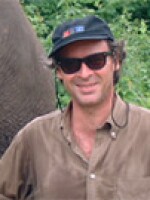ROBERT SIEGEL, host:
Today, Myanmar's ruling military chief said that he would be willing to meet with detained opposition leader Aun San Suu Kyi, but only if she gives up what he called her obstructive measures.
Myanmar's state media says more than twenty-one hundred activists were arrested in last week's huge anti-government demonstrations led by Buddhist monks and it says a third of them have been released. Confirming such claims is difficult. Access to Myanmar, or Burma, is limited and Internet connections have been severed.
NPR's Michael Sullivan is in Maysot on the Thai border where he spoke to monks who fled a violent crackdown.
MICHAEL SULLIVAN: The two monks sit in the office of an opposition group under report to Aung San Suu Kyi. Their trip took four days, much of it spent hiding from police and the army. They cross the river into Thailand on Monday.
VIDA(ph) (Buddhist Monk): (Speaking in foreign language)
SULLIVAN: The older of the two, Vida, does most of the talking. He says their monastery joined the demonstrations late on the 26th, the day the crackdown began. They declined to join sooner, Vida says, because they weren't a very political bunch. But in the end, he says, they decided to join because the people were getting poorer, the problems bigger, and the army didn't seem to care.
VIDA: (Speaking in Foreign Language)
SULLIVAN: Last Thursday, he continues, about 200 monks from his monastery joined the large crowed that marched to Sule Pagoda in the center of the city. They prayed there undisturbed, he says, and were on their way home when riot police attacked.
VIDA: (Speaking in Foreign Language)
SULLIVAN: They started firing teargas into the crowd, he says. We started to run. And then I heard several gunshots. He is certain the security forces fired into, not over the crowd. And then, he says, the police waited in, beating people and hauling them away.
Neither Vida nor his fellow monk, Siri(ph), recall seeing anyone killed, though, he says, he did see many injured.
VIDA: (Speaking in Foreign Language)
SULLIVAN: They didn't go back to the monastery, he says, the police were already there.
Some city people hid them for the night, and the next day they decided to head for Thailand. At the bus station, a driver took pity on them and gave them tickets to Pa-an, about 100 miles to the east.
VIDA: (Speaking in Foreign Language)
SULLIVAN; We got there and hid until dark, he says, then we went to a monastery. But they wouldn't allow us to stay. They were afraid because the security forces had warned them not to take in people like us. So we stayed with some ordinary people. We were afraid for them, he says, in case we were caught, but we had nowhere else to go.
From there they made it across the border without any further trouble. Both Siri and Vida expect the protesters to lay low for a few weeks before they begin again.
VIDA: (Speaking in Foreign Language)
SULLIVAN: We want four things, the two men say, and they're non-negotiable. One, the release of all political prisoners, including Aung San Suu Kyi. Two, roll back the recent fuel increases. Three, start a dialogue with the opposition. And four, put an end to this violence. Vida says it's impossible to tell how many monks were killed. He knows that many monasteries were raided, their monks arrested.
But many more are empty, he says, because the monks are now in hiding. His friend, Siri, says he knows what's going to happen to the police and the military who used force against the monks.
SIRI (Buddhist Monk): (Speaking in Foreign Language)
SULLIVAN: They are going to the deepest level of hell, he says, and then he repeats it for emphasis. Not a very Buddhist thought, he admits, but what they did to the monks and the people, he says, isn't very Buddhist either. His friend, Vida, agrees.
VIDA: (Speaking in Foreign Language)
SULLIVAN: The people who did this, they know what they did, he says softly, and they know they're going to pay.
Michael Sullivan, NPR News, Maysot, Thailand. Transcript provided by NPR, Copyright NPR.






